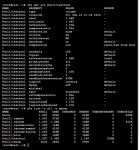Derek Storvik
Cadet
- Joined
- Feb 19, 2014
- Messages
- 6
FreeNAS-9.1.1-RELEASE-x64 (a752d35)
I have a storage pool storage1 that has a capacity of 13.6 TB 10 drives in a "raid 10" setup ( mirrors and stripes.)
The zpool reports
size = 13.6 tb
free = 2.63 tb
allocated = 11.0TB
zfs get all reports
storage1 type filesystem -
storage1 used 11.0T -
storage1 available 2.42T -
storage1 referenced 152K -
storage1 quota none default
storage1 reservation none default
storage1 recordsize 128K default
on this volume/pol is a dataset called S1-Dataset
zfs get all reports on it
storage1/S1-Dataset type filesystem -
storage1/S1-Dataset used 11.0T -
storage1/S1-Dataset available 2.42T -
storage1/S1-Dataset referenced 11.0T -
storage1/S1-Dataset quota none default
storage1/S1-Dataset reservation none default
storage1/S1-Dataset recordsize 128K default
storage1/S1-Dataset usedbydataset 11.0T -
on this dataset sits a file extent for iscsi that is connected to vmware hosts
this all seems fine until vmware reports 8TB free on this volume and only 5Tb of actual machines and data are on the iscsi volume.
I"m trying to figure out why it seems that zfs thinks it is using or IS using so much more space than the data I have put on the NAS from VMWARE.
Any help would be appreciated.
Thanks
I have a storage pool storage1 that has a capacity of 13.6 TB 10 drives in a "raid 10" setup ( mirrors and stripes.)
The zpool reports
size = 13.6 tb
free = 2.63 tb
allocated = 11.0TB
zfs get all reports
storage1 type filesystem -
storage1 used 11.0T -
storage1 available 2.42T -
storage1 referenced 152K -
storage1 quota none default
storage1 reservation none default
storage1 recordsize 128K default
on this volume/pol is a dataset called S1-Dataset
zfs get all reports on it
storage1/S1-Dataset type filesystem -
storage1/S1-Dataset used 11.0T -
storage1/S1-Dataset available 2.42T -
storage1/S1-Dataset referenced 11.0T -
storage1/S1-Dataset quota none default
storage1/S1-Dataset reservation none default
storage1/S1-Dataset recordsize 128K default
storage1/S1-Dataset usedbydataset 11.0T -
on this dataset sits a file extent for iscsi that is connected to vmware hosts
this all seems fine until vmware reports 8TB free on this volume and only 5Tb of actual machines and data are on the iscsi volume.
I"m trying to figure out why it seems that zfs thinks it is using or IS using so much more space than the data I have put on the NAS from VMWARE.
Any help would be appreciated.
Thanks

